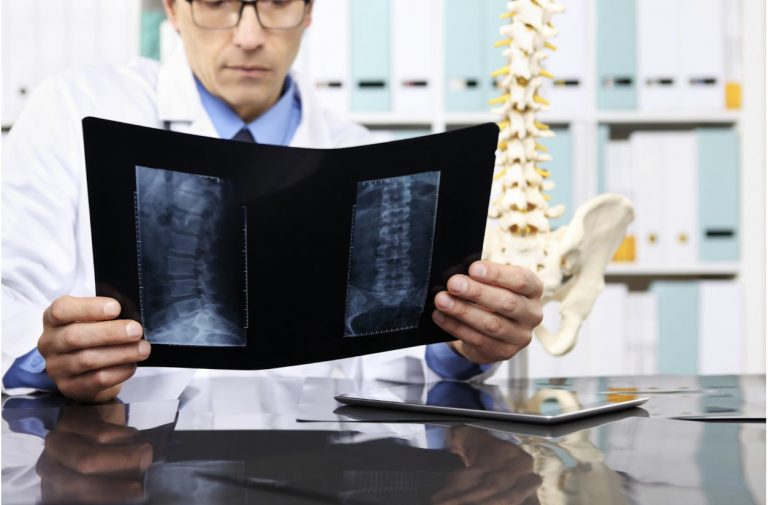Whether you call it a slipped disc, slip disc, disc slip, bulging disc, or herniated disc, back pain and other symptoms from any condition related to a damaged spinal disc can be excruciating. The lost mobility and discomfort can affect your family time, ability to work, and your hobbies and leisure activities. Fortunately, there are effective treatment options that can offer significant relief, particularly when combined with a healthy lifestyle.
A great first step in your journey to relief is educating yourself as a patient, including about the terms describing disc-related conditions. Terms such as slipped disc or slip disc, are actually nonmedical descriptions of conditions ranging from herniated discs to bulging discs. By learning more about the causes of these conditions and the effective treatment options, you can give yourself the best chance of finding the back pain or neck pain relief you deserve.
If you have any questions about the following information or want to learn more about effective treatment, please feel free to get in touch with our team. The BEST Health System team is here to help.
Understanding Spinal Disc Conditions
The discs in the spinal column essentially act as shock absorbers for the vertebrae, allowing the spine to bend and flex. The discs are made of a tough outer layer consisting of cartilage and a gelatinous inner layer. Over time, the discs begin to lose their natural elasticity due to aging and other causes.
This causes the discs to be less able to withstand daily pressures and more susceptible to injuries. The term slipped disc most commonly refers to a condition known as a herniated disc. This is when the gelatinous inner layer pushes or slips, through a tear or weak spot in the outer layer. A slipped disc can also refer to a condition called spondylolisthesis, where an individual vertebra and accompanying disc slip out of its normal place in the spinal column.
Symptoms of a Slipped Disc
Symptoms of disc conditions are usually caused by compression of nerves by disc material. The discs themselves have very little nervous tissue and so it’s rare for the disc themselves to cause pain. However, due to the limited space in the spinal column, a disc bulge or herniated disc material can narrow the nerve pathways, compressing or irritating surrounding nerves.
This can lead to the following common slipped disc symptoms:
- Back pain
- Neck pain
- Radiating pain into the upper or lower extremities
- Tingling, numbness, and muscle weakness
- Spasms
- Leg pain and difficulty walking
Diagnosis and Treatment
Anyone experiencing any of the above symptoms for longer than a few days or a week should see their doctor for diagnosis and treatment. A qualified medical professional can tell you what specific condition your slipped disc actually is by taking the following steps:
- Reviewing your medical and treatment history
- Asking questions about symptoms and how they affect your lifestyle
- Performing a hands-on examination movement tests
- Ordering diagnostic testing such as an MRI or X-ray
After continuing treatment of a disc-related condition, conservative treatments will usually be attempted first. Common options include:
- Periods of rest
- Medication, including over the counter nonsteroidal anti-inflammatories such as ibuprofen
- Physical therapy
- Pain-relieving steroid injections
It is also important to practice good posture, eat a healthy diet and stay physically active. These can reduce pressure on the spine, relieve inflammation and help strengthen muscles and improve circulation.
The Difference
The most common cause of herniated disc is age-related wear and tear. This is known as disc degeneration. As your body ages, the amount of water in your vertebral discs decreases, making them less flexible and more prone to tearing. Certain motions, such as twisting, turning, or lifting can also cause a herniated disc. Although less common, an injury such as a car accident or a blow to the back can cause a herniated disc.
Like a herniated disc, the most common cause of a bulging disc is degenerative disc disease. A bulging disc may also be caused by neck or back strain brought on by repetitive movements, lifting heavy objects, and poor posture. This condition can also be caused by trauma such as a blow to the back, although this is rare.
- Wear and tear caused by degenerative disc disease
- Strain due to heavy lifting and repetitive movements
- Poor posture while standing or sitting
- A hereditary condition
Exploring Surgical Options
Conservative treatments are often effective, but surgery can become a serious consideration if weeks or months go by and symptoms do not improve. Spine surgery such as discectomy, where the surgeon removes only the disc material that is causing nerve compression, can be performed using minimally invasive techniques on an outpatient basis. This allows patients to be up and on their feet within hours of the procedure and start the all-important recovery phase sooner.
If you are living with a slipped disc condition such as a herniated disc or bulging disc, the caring team at BEST Health System can help. Our multidisciplinary experts can help you design a personalized treatment plan built for your needs and specific diagnosis.
